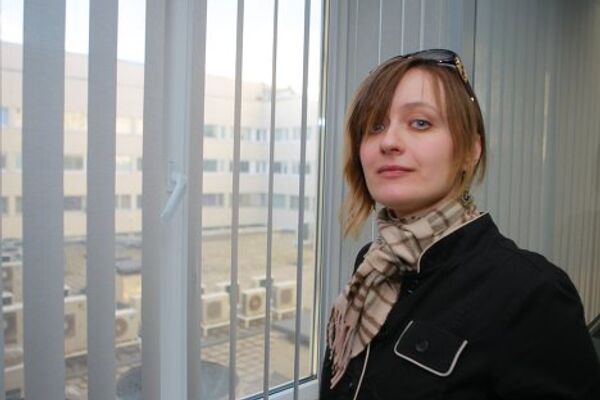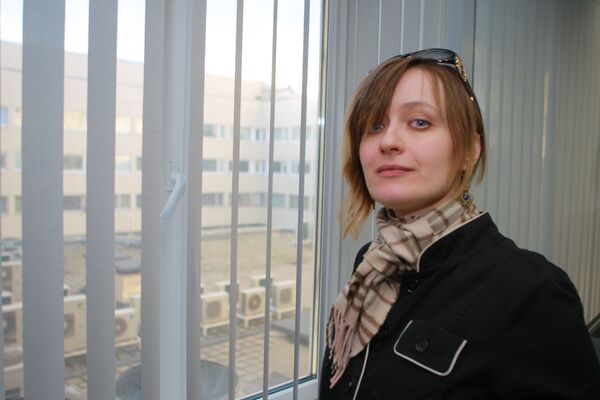Of all the mayhem that took place last week in Boston, there was an image I willed to stay with me: a photo showing a local police officer in a bulletproof vest, carrying two gallons of milk in a residential area.

The caption of the photo, which made the rounds on Facebook over the weekend, read that the officer had elected to help out a family with small children that was out of milk and stuck at home during the lockdown.
As the mother of a small child, I could immediately relate to the horror of being forced to remain at home with an empty fridge. Forget terrorists – the screaming alone would kill you.
As a Moscow resident, I also thought about the image of our own police officers. Several of my Russian friends shared the photo with disdainful comments of their own, messages that amounted to, “Try getting a Moscow cop to do something like THAT during a lockdown. Fat chance.”
Of course, one should probably try imposing a lockdown on Moscow and see how that works out (hint: It will not work out), before one judges.
And yet I understood the sentiment my Russian friends were expressing. In a city like Moscow, authority figures simply can’t appear too caring. It would go against everything they were taught. It would make them look soft, possibly vulnerable – and vulnerability is frequently punished.
But I remembered a story that happened to a former Moscow neighbor of mine a couple of years ago. This story will never go viral on Facebook – and not just because there is no photographic evidence. Simply put, most people wouldn’t believe it.
And yet as a witness to part of it, I can at least confirm some of the details.
This neighbor, an ancient lady of the sort one might describe as “old Soviet intelligentsia,” had a nasty run-in with a member of Moscow’s nouveau riche. He nearly ran her over on a pedestrian crossing in his luxury car, and she injured herself while lunging out of the way. The guy tried to speed off, but ended up losing control of his vehicle and crashing it into a construction fence.
I wasn’t there for the immediate aftermath, but was living in that neighborhood at the time, and hearing about what had happened, elected to meet her at the police station and walk her home. She didn’t need hospitalization, but she was badly shaken and, worse still, humiliated by the man who had nearly run her over. Apparently, he had screamed at her that it was all her fault, that she was an “old bag” and “too slow.” This may seem shocking, but if you know anything about the Moscow nouveau riche, you won’t be shocked at all.
I waited for her from across the street and saw her walk out, shaking, barely able to retain her composure, after giving a statement to the police. There was a little hat with velvet flowers on her head, and the hat alone broke my heart. For an older woman, she had taken such great pains to always look her best – and here she was, looking fragile and lost, with the hat askew on her gray hair.
As I made my way over to her, an old cop car drove out of the parking lot adjacent to the station, and a policeman inside rolled down his window.
“Get in, we’ll drive you home, it’s only a few blocks,” he said. My neighbor asked if I could join, and they nodded, so I got in. On our way back to her building, the two policemen sitting up front consoled this old, lonely woman the best way they knew how.
From what I gathered later, they had witnessed her being berated and humiliated after having been nearly run over by the member of the so-called “elite” – and took umbrage. So they told stupid jokes and made her laugh, and told her that things would be OK.
It was a very short and surreal ride in a Moscow cop car, but I have not forgotten it. I have not forgotten the officers’ eyes in the rearview mirror, as they told her that the guy would surely “get his due.”
I never did find out what happened to the guy in question – whether he suffered any consequences, whether he at least had his license suspended, or if he pulled strings and got off scot-free, as people like him frequently do.
My neighbor died soon after, when I was away. She had a chronic illness she had taken pains to conceal. Her heirs, who live far away, I didn’t know very well.
But I do think about this woman, already in the last weeks of her life, being helped out of that police car and walked all the way to her apartment. I think about those two cops – one older and one younger. They weren’t being heroes that day, but they did act like human beings, which can be heroic in the right kind of context.
I hope they’ve continued to act like human beings – and I hope that one day, they too will go viral on Facebook for performing a small act of kindness. If only to remind us that Moscow’s cops can also be kind.
Trendwatching in Russia is an extreme sport: if you’re not dodging champagne corks at weddings, you’re busy avoiding getting trampled by spike heels on public transportation. Thankfully, due to an amazing combination of masochism and bravado, I will do it for you while you read all about it from the safety of your living room.
Natalia Antonova is the acting editor-in-chief of The Moscow News. She also works as a playwright – her work has been featured at the Lyubimovka Festival in Moscow and Gogolfest in Kiev, Ukraine. She was born in Ukraine, but spent most of her life in the United States. She graduated from Duke University, where she majored in English and Slavic Literature. Before coming to Moscow, she worked in Dubai, UAE and Amman, Jordan. Her writing has been featured in The Guardian, Foreign Policy, Russia Profile, AlterNet, et al.
Trendwatcher: Russia and United States Wage War of the Lists
Trendwatcher: Movie Legend Yury Arabov Goes for Broke
Trendwatcher: Moscow Real Estate Is Literally Hot
Trendwatcher: Cyprus Bailout: March Madness for Russia’s Rich
Trendwatcher: When Being a Middle-Aged Russian Man Is a Death Sentence
Trendwatcher: In (Grudging) Praise of Moscow’s Awesomely Rude Salespeople
Trendwatcher: Rebel Dzhigurda Does the Harlem Shake in Moscow
Trendwatcher: Of Blonds, Corruption and Poetry

